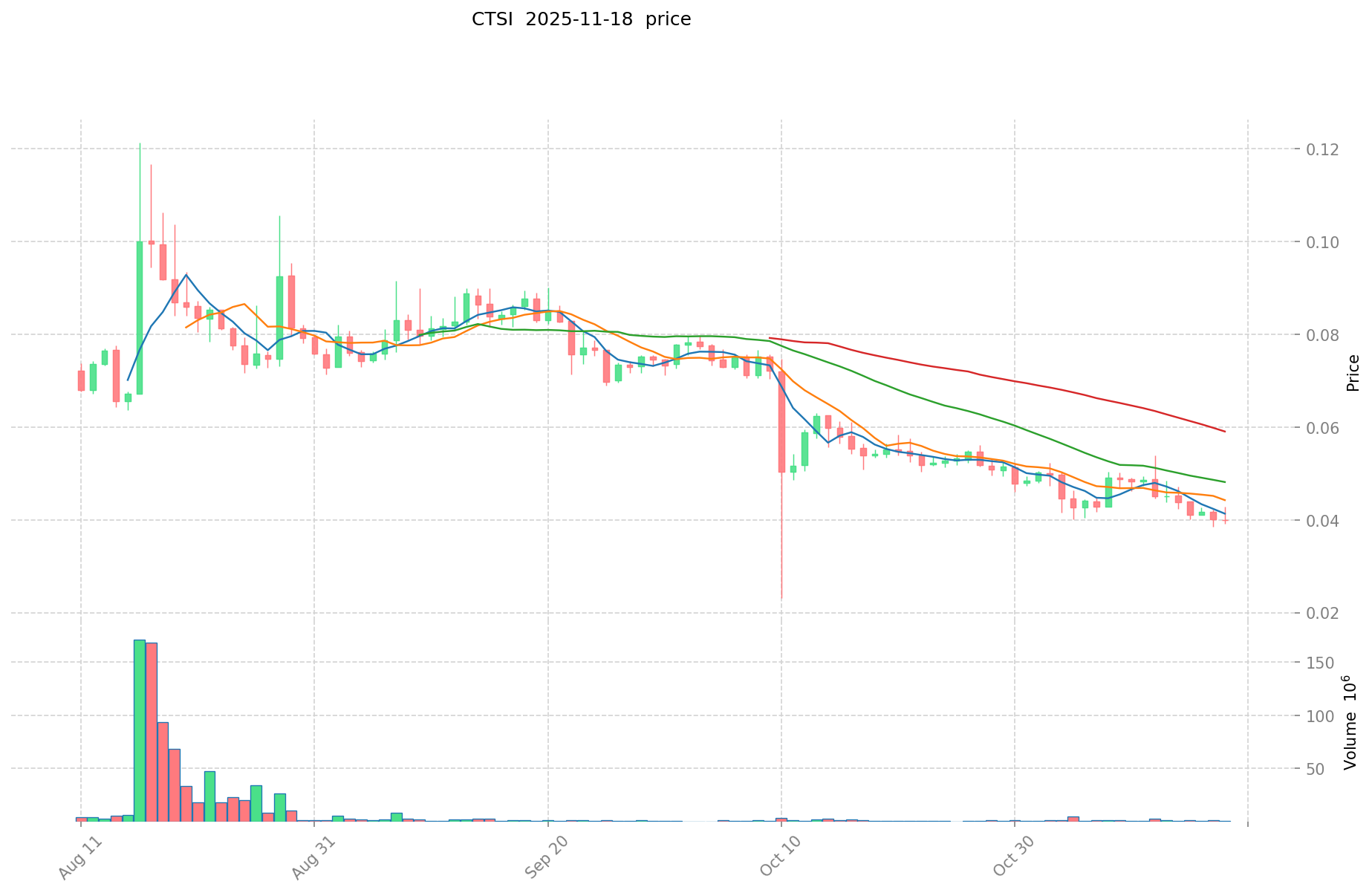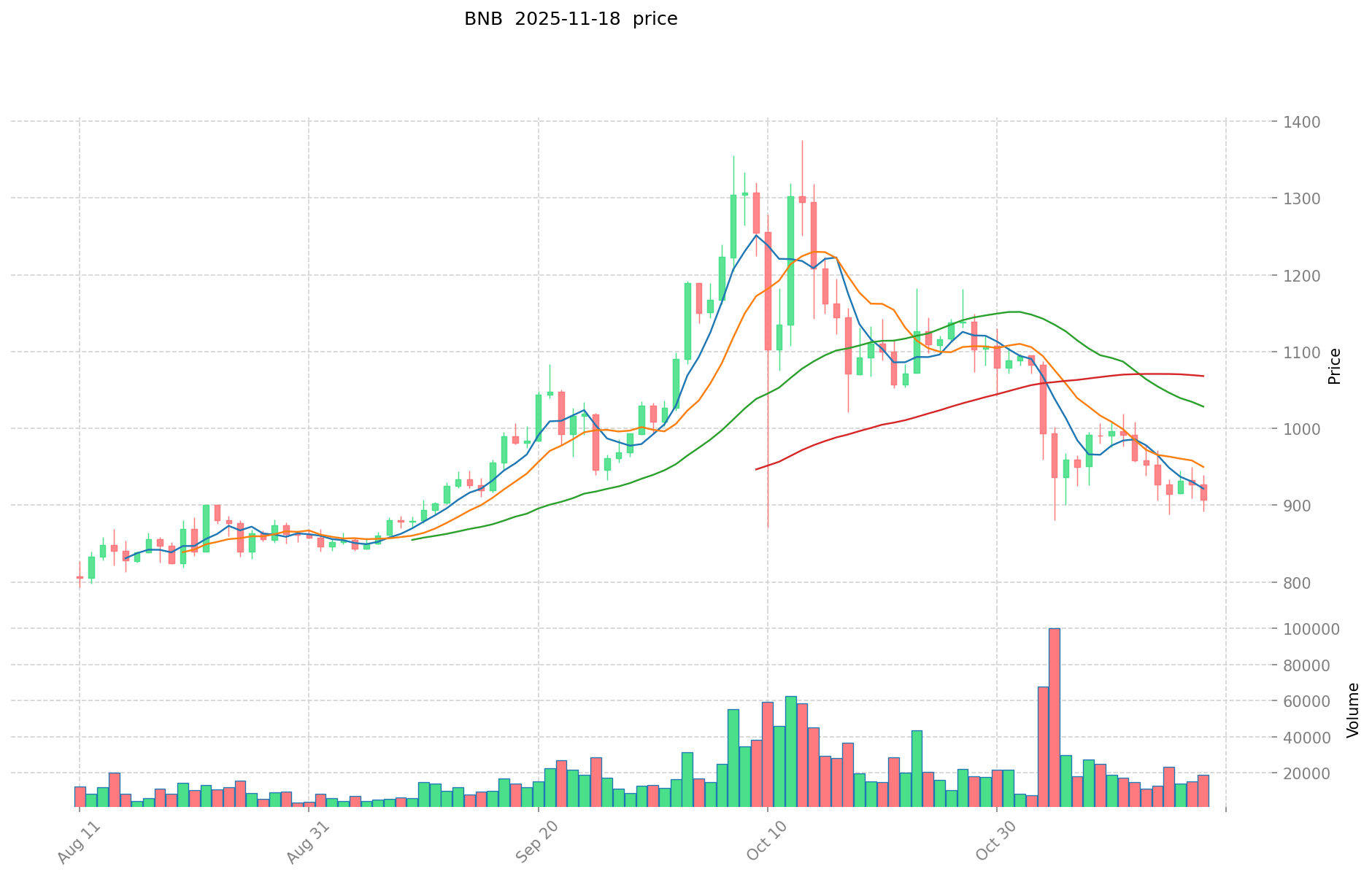CTSI vs BNB: A Comparative Analysis of Two Promising Blockchain Platforms
Introduction: CTSI vs BNB Investment Comparison
In the cryptocurrency market, the comparison between Cartesi (CTSI) and Binance Coin (BNB) has always been a topic that investors cannot ignore. The two not only have significant differences in market cap ranking, application scenarios, and price performance, but also represent different positioning in crypto assets.
Cartesi (CTSI): Since its launch in 2020, it has gained market recognition for its role as a layer-2 solution providing off-chain Linux-based computation for blockchain applications.
Binance Coin (BNB): Introduced in 2017, it has been hailed as the "utility token of the Binance ecosystem" and is one of the cryptocurrencies with the highest global trading volume and market capitalization.
This article will comprehensively analyze the investment value comparison between CTSI and BNB, focusing on historical price trends, supply mechanisms, institutional adoption, technological ecosystems, and future predictions, attempting to answer the question investors care about most:
"Which is the better buy right now?"
I. Price History Comparison and Current Market Status
CTSI and BNB Historical Price Trends
- 2021: CTSI reached its all-time high of $1.74 on May 9, 2021, due to growing interest in Layer 2 scaling solutions.
- 2021: BNB saw significant price growth, reaching an all-time high of $686.31 on May 10, 2021, driven by the rapid expansion of the Binance Smart Chain ecosystem.
- Comparative analysis: During the 2021 bull market, CTSI rose from its launch price of $0.015 to $1.74, while BNB experienced even more dramatic growth, rising from under $40 to over $680.
Current Market Situation (2025-11-18)
- CTSI current price: $0.04016
- BNB current price: $919
- 24-hour trading volume: CTSI $47,940,961 vs BNB $22,974,834,896
- Market Sentiment Index (Fear & Greed Index): 11 (Extreme Fear)
Click to view real-time prices:
- View CTSI current price Market Price
- View BNB current price Market Price


Comparative Investment Analysis: CTSI vs BNB
Technical Innovation & Platform Utility
- CTSI: Core value lies in its innovative blockchain technology that allows developers to break through shared computing and EVM design limitations. Cartesi Rollups provide a versatile scaling solution deployable as Layer 2, Layer 3, or sovereign Rollups.
- BNB: Value is primarily derived from its utility within the Binance ecosystem, with long-term positive market trends supporting its growth potential.
- 📌 Key Differentiator: CTSI focuses on developer tools and computational capabilities, while BNB's value is tied to exchange platform usage and broader ecosystem functionality.
Ecosystem Development & Integration
- CTSI Ecosystem: Enables developers to create more complex and computationally intensive dApps through dedicated CPU resources, eliminating competition for processing power.
- BNB Ecosystem: Powers the Binance platform, which continues to expand its service offerings and market presence, enhancing BNB's utility.
- Market Integration: BNB has wider market recognition and established use cases, while CTSI is positioned as a specialized developer-oriented solution.
Investment Considerations
- CTSI Potential: Value proposition centered on technological innovation allowing for more complex on-chain applications, with modular scaling solutions maintaining strong security from base layers like Ethereum.
- BNB Stability: Platform value and established market position provide a foundation for continued growth and utility enhancement.
- Risk Assessment: CTSI represents a more specialized technological investment, while BNB offers exposure to the broader exchange and crypto services ecosystem.
Market Performance Indicators
- CTSI Market Cap: Approximately 887.08 million CTSI in circulation with significant token events including the April 2021 token unlock.
- BNB Market Position: Consistently ranked among top cryptocurrencies with strong backing from the Binance exchange infrastructure.
- Investment Strategy: Both assets require consideration of actual applications and market prospects rather than speculative positions.
III. 2025-2030 Price Prediction: CTSI vs BNB
Short-term Prediction (2025)
- CTSI: Conservative $0.0328984 - $0.04012 | Optimistic $0.04012 - $0.0565692
- BNB: Conservative $799.356 - $918.8 | Optimistic $918.8 - $1258.756
Mid-term Prediction (2027)
- CTSI may enter a growth phase, with expected price range $0.0504717624 - $0.06785648056
- BNB may enter a volatile phase, with expected price range $580.2642351 - $1627.0154043
- Key drivers: Institutional inflows, ETFs, ecosystem development
Long-term Prediction (2030)
- CTSI: Base scenario $0.056859457433396 - $0.071074321791746 | Optimistic scenario $0.071074321791746 - $0.08102472684259
- BNB: Base scenario $1043.49335529614175 - $2006.71799095411875 | Optimistic scenario $2006.71799095411875 - $2889.673906973931
Disclaimer: This information is for educational purposes only and should not be considered as financial advice. Cryptocurrency markets are highly volatile and unpredictable. Always conduct your own research before making any investment decisions.
CTSI:
| 年份 | 预测最高价 | 预测平均价格 | 预测最低价 | 涨跌幅 |
|---|---|---|---|---|
| 2025 | 0.0565692 | 0.04012 | 0.0328984 | 0 |
| 2026 | 0.063814872 | 0.0483446 | 0.042059802 | 20 |
| 2027 | 0.06785648056 | 0.056079736 | 0.0504717624 | 39 |
| 2028 | 0.0780798164328 | 0.06196810828 | 0.0539122542036 | 54 |
| 2029 | 0.072124681227092 | 0.0700239623564 | 0.037112700048892 | 74 |
| 2030 | 0.08102472684259 | 0.071074321791746 | 0.056859457433396 | 76 |
BNB:
| 年份 | 预测最高价 | 预测平均价格 | 预测最低价 | 涨跌幅 |
|---|---|---|---|---|
| 2025 | 1258.756 | 918.8 | 799.356 | 0 |
| 2026 | 1186.76802 | 1088.778 | 1034.3391 | 18 |
| 2027 | 1627.0154043 | 1137.77301 | 580.2642351 | 23 |
| 2028 | 1893.8800637955 | 1382.39420715 | 801.788640147 | 50 |
| 2029 | 2375.2988464354875 | 1638.13713547275 | 982.88228128365 | 78 |
| 2030 | 2889.673906973931 | 2006.71799095411875 | 1043.49335529614175 | 118 |
IV. Investment Strategy Comparison: CTSI vs BNB
Long-term vs Short-term Investment Strategies
- CTSI: Suitable for investors focused on Layer 2 solutions and computational capabilities
- BNB: Suitable for investors seeking ecosystem utility and exchange-backed stability
Risk Management and Asset Allocation
- Conservative investors: CTSI: 10% vs BNB: 90%
- Aggressive investors: CTSI: 30% vs BNB: 70%
- Hedging tools: Stablecoin allocation, options, cross-currency portfolios
V. Potential Risk Comparison
Market Risks
- CTSI: Higher volatility due to smaller market cap and specialized focus
- BNB: Exposure to exchange-related risks and market sentiment shifts
Technical Risks
- CTSI: Scalability, network stability
- BNB: Centralization concerns, security vulnerabilities
Regulatory Risks
- Global regulatory policies may have differing impacts on both assets
VI. Conclusion: Which Is the Better Buy?
📌 Investment Value Summary:
- CTSI advantages: Innovative Layer 2 solution, potential for complex dApp development
- BNB advantages: Strong ecosystem utility, exchange backing, established market position
✅ Investment Advice:
- New investors: Consider a small allocation to CTSI for exposure to Layer 2 technology, with a larger position in BNB for stability
- Experienced investors: Balanced portfolio with both assets, adjusting based on risk tolerance
- Institutional investors: Strategic allocation to both, with emphasis on BNB for liquidity and CTSI for technological exposure
⚠️ Risk Warning: Cryptocurrency markets are highly volatile. This article does not constitute investment advice. None
VII. FAQ
Q1: What are the main differences between CTSI and BNB? A: CTSI is a Layer 2 solution focused on off-chain Linux-based computation for blockchain applications, while BNB is the utility token of the Binance ecosystem with wider market recognition and established use cases.
Q2: Which cryptocurrency has shown better historical price performance? A: Historically, BNB has shown stronger price performance, rising from under $40 to over $680 during the 2021 bull market, compared to CTSI's rise from $0.015 to $1.74 in the same period.
Q3: What are the key investment considerations for CTSI and BNB? A: CTSI's value proposition centers on technological innovation for complex on-chain applications, while BNB offers stability and exposure to the broader exchange and crypto services ecosystem.
Q4: How do the 2030 price predictions compare for CTSI and BNB? A: The optimistic scenario for 2030 predicts CTSI could reach $0.08102472684259, while BNB could potentially reach $2889.673906973931.
Q5: What are the recommended investment strategies for CTSI and BNB? A: Conservative investors might consider allocating 10% to CTSI and 90% to BNB, while aggressive investors might opt for 30% CTSI and 70% BNB. New investors are advised to have a larger position in BNB for stability.
Q6: What are the main risks associated with investing in CTSI and BNB? A: CTSI faces higher volatility due to its smaller market cap and specialized focus, as well as technical risks related to scalability. BNB is exposed to exchange-related risks and potential centralization concerns.
Q7: Which cryptocurrency might be better for long-term investment? A: Both have potential for long-term growth, but BNB may be considered more stable due to its established ecosystem and market position. CTSI could offer higher growth potential if its technological innovations gain wider adoption.
Share
Content